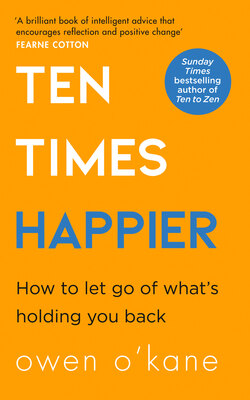Читать книгу Ten Times Happier - Owen O’Kane - Страница 21
UNDERSTANDING OUR MINDS A LITTLE MORE
ОглавлениеWe have around 60–80,000 thoughts per day according to neuroscientific research. Some of the research indicates that as much as 60 to 70 per cent of thought content can be negative in nature. When I say negative, let me give some context. Back in Neanderthal times it was helpful to have fearful protective thoughts as a means of staying safe from predatory animals. The problem is we have evolved as a species and we don’t need as many of these types of thoughts to protect us any more.
It’s important to understand that most of our thoughts are automated processes and link closely with our life experiences, culture, rules, beliefs and predisposition. This is how our neurological pathways develop thought patterns. In simple terms, we have often formed habitual ways of thinking that are the ‘norm’ for us but not necessarily helpful. Don’t fret though because, like all habits, thought habits can be unlearnt.
Look at the statements below. They represent some habitual unhelpful thinking styles. How many of these are familiar to you? Take a little time with this to try to see how many you can personally identify with.
• I won’t be able to do it
• I’m not good enough
• Nothing good ever happens to me
• Everything is terrible
• It has to be this way or I won’t do it
• I think someone else will be better for the job
• This is a disaster
• It’s not my problem
• This is not fair
It doesn’t matter whether you tick one or all of the above, the important thing here is that you recognize your unhelpful thinking patterns. Let us explore a little further how these ways of thinking impact the mind.
• If you engage and cooperate with a mind that tells you you won’t be able to do something, then in life you are unlikely to take any risks.
• If you listen to a mind that tells you that you’re not good enough, then you will transmit that vibe to the world and those around you.
• If you take seriously a mind that tells you that nothing good happens for you, then you lose sight of any positive or joyful events that do occur.
• If you cooperate with a mind telling you everything is terrible, then life will feel terrible a lot of the time.
• If you abide with a mind instructing you that it has to be this way or nothing, then you become inflexible and rigid. This is an uncomfortable way to live.
Most of these negative ways of thinking are simply habits of thought, not facts. I am going to repeat that. Most of what you think is thought, not fact. The challenge is how you decide to relate to your thoughts. If you believe the content of your mind to be the gospel truth, then you will struggle, and happiness will be absent. The freedom comes when you decide not to believe absolutely everything your mind is telling you and when you realize what you can let go of.
Every person reading this book will have an area of their life that their mind is getting in the way of. It might be a relationship issue, making a change, going for a promotion, making a fresh start or taking a risk. I would encourage you to list now three key areas in your life that feel blocked or limited by your mind, your way of thinking.
Would you like your thoughts to have less hold over your life?
If yes, then you are halfway there. The motivation to change is a large part of the journey.
